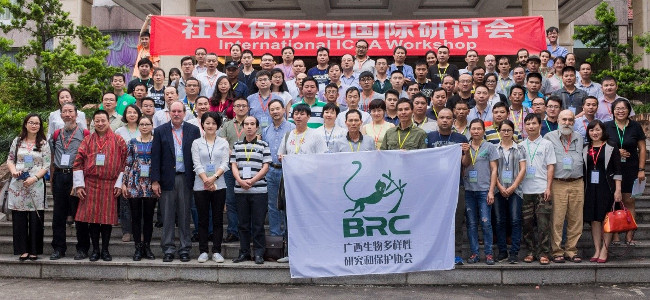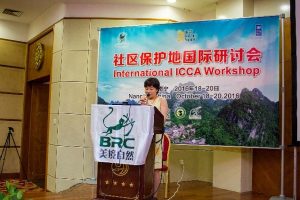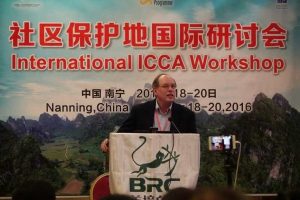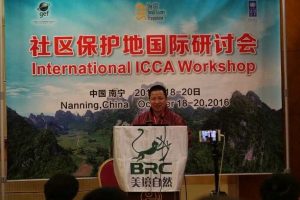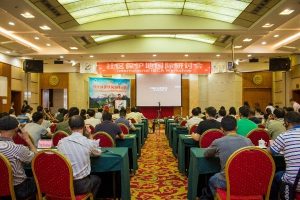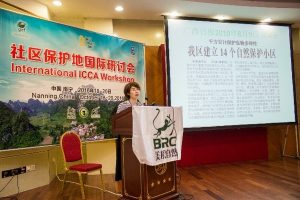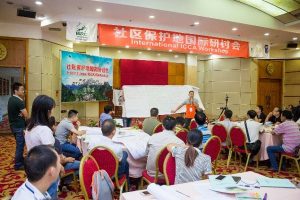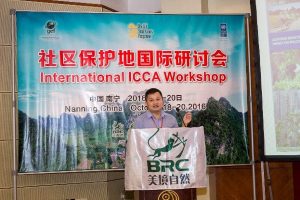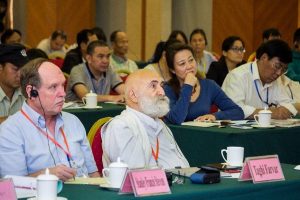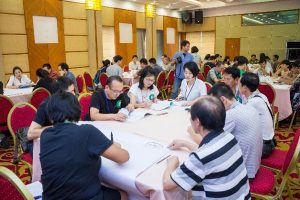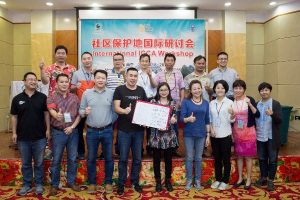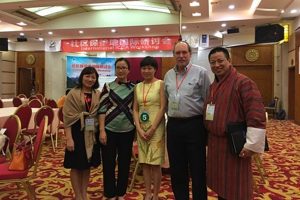First published on 10/21/2016, and last updated on 01/23/2019
The ICCA workshop was successfully held in Nanning during 18 to 20 October 2016. It was organised by UNDP/GEF SGP and co-organised by the Guangxi Biodiversity Research and Conservation Association (SGP grantee), Guangxi Wildlife Conservation Society and Fauna and Flora International China.
The workshop brought 103 participants together including overseas guests (9, 7 males and 2 females), Chinese experts and scholars (13, 9 males and 4 females), government officials (37, 30 males and 7 females), civil society organisation representatives (16, 9 males and 7 females), community villagers representatives (22, 21males and 1 females), volunteers (7, 3 males and 4 females) and media (7).
The workshop was a fruitful one, sharing the ICCA global development situation, international policies related to ICCA and a number of cases from China, the United States, Bhutan, Vietnam, Iran and Taiwan, Province of China. Participants not only saw from the international perspective of ICCA in the global model, but also learned about the long history of the concept of ICCA in China, and ICCA’s value in accordance with the current ecological civilisation policy in China. The case studies of the practitioners from Guangxi, Yunnan, Sichuan, Guizhou and Qinghai demonstrated the values of ICCAs and proved that the appropriate actions in ICCA would bring positive effects in ecology, politics, economy, culture and other aspects. The workshop also arranged site visits for two community conserved areas in Qu Nan and Xin Tuan villages near Nanning, the capital of Guangxi. During the site-visit, the participants got the hands-on understanding of the local history, current situation and future development of the community conserved areas, and carried out in-depth discussions. During the visit, we were confronted with a typhoon and heavy autum rains, which put much pressure on the whole trip and the rear service arrangements. This visit, however, provided a good opportunity for the participants to have a full understanding of this area and exchange opinions with each other.
The eight issues of ICCA were discussed in the workshop, where delegates from different places sat together to discuss and draw the future action plans. The delegates finally reached a consensus and adopted the following proposal, which was signed by the relevant representatives. The adoption of the proposal pushed this workshop to the climax, which not only increased the confidence of local policymakers and practitioners, but also ptomoted the mainstreaming of ICCA development in China in the future.

In addition, the participants established a social network platform during the meeting. And they will continue to share information about ICCAs and other relevant aspects through this platform after the meeting.
Proposals for Promoting the Development of ICCA and Paying Great Importance to the Reform of Ecological Civilisation
The ICCA Workshop was held in Nanning, GuangXi during 18 to 20 October 2016. We gathered 103 delegates together to share and discuss the world’s latest trends, the national policies and current situation of different regions and the latest practices of ICCA.
In order to better promote the development of ICCA and make greater contributions to the delivery of the national ecological strategic objectives and the comprehensive construction of a well-off society, the representitives reached the following consensus:
- ICCA is a kind of conservation area for the people to protect and manage on a voluntary basis, which enjoys a long history in China. People of various provinces and nationalities have created such effective pattern that foster the sustainable use of natural resources, sustain ecological security and spread and inherit ecological culture during their long-term production and life. In the management of ICCA, the ecological culture insisted on by the community and ecological knowledge accumlated by the community are the essence of the Chinese nations’ ecological civilisation. China’s ICCAs have made great contributions to the global biodiversity’s conservation and sustainable use. That can be an important instrument for the implementation of the Convention on Biological Diversity.
- The 18th National Congress of the Communist Party of China put the construction of ecological civilisation into the overall structure of “Five in One” with Chinese characteristics, bringing forward the concept of ecological civilisation which respects nature, conforms to nature and protects nature. The meeting pointed out the integration of ecological civilisation construction into economic construction, political construction, cultural construction and social construction, so that the importance of people in the national ecological strategy could be increasingly prominent. This opened up a new era and new situation for the ICCA.
- The reform of the national ecological civilisation has brought new opportunities for the development of ICCAs also given greater responsibilities to the community. We set forth higher and more comprehensive requirements, so the development concept of innovation, coordination, greenness, openness and sharing was needed. Besides, the people of the community, government, research institutions, civil society organisations and the community need to unite with each other to make joint efforts.
On the basis of the above consensus, we recommend to:
- Define and explain the connotation of community-based conservation areas in an inclusive and scientific manner according to the macro-environment of the development of ICCA in the new era. Respect and care for the community’s willingness of self-conservtaion, and maximise the coordination of all forces. Meanwhile, collect resources from all directions to support the health and long-term development of ICCA in China.
- Provide comprehensive and proper support and services for the community, which include but are not limited to:
- Supporting the demarcation of ICCAs;
- Formulation and dynamic change on village rules and regulations, improving the community’s capacity on public affairs management and promoting the practice of the grassroots democracy system;
- Encouraging the community to inherit the ecological culture, enhance the cohesion of the community, promote the integration of traditional ecological knowledge and modern science, and continuously improve the community’s capacity of conservation and sustainable development;
- Promoting the ICCA as a window to spread ecological civilisation;
- Providing the necessary policy inclination and establishing the proper incentive mechanism for the sustainable livelihood development of the people in ICCAs.
- Actively carry out the pilot demonstration of ICCAs; encourage first try, and summarise timely lessons learnt; form the best practices and a diversity of management practices; award the advanced communities, institutions and individuals.
- Combine with the national ecological civilisation system reform to prepare a special development plan of ICCAs or put it into a variety of planning; promote national large-scale ecological projects on community support and efforts to support the development of ICCAs; establish mechanisms to encourage and facilitate the participation of all sectors of society in the development of ICCAs, such as investment, financing and scientific and technological support; put the promotion of ICCAs into a sound Payment for Ecosystem Service mechanism to promote the establishment of the legal status of ICCAs and strengthen the rule of law protection.
- Strengthen cross-regional exchanges and cooperation; fully learn from and absorb international experiences and lessons learnt; sum up and publicise the achievement of ICCAs in China; build a broad, active, strong, influential exchange and cooperation platform for ICCA promotion according to local conditions; full docking at a variety of home and abroad high-end think tanks.
In this golden October, we harvest a great consensus in this beautiful city. We will combine our own work and life, striving to practice and promote the consensus vigorously, to sew the seeds of wisdom for welcoming a vibrant spring of ICCAs in China
By Yi Liu, National Coordinator, SGP, UNDP, China
